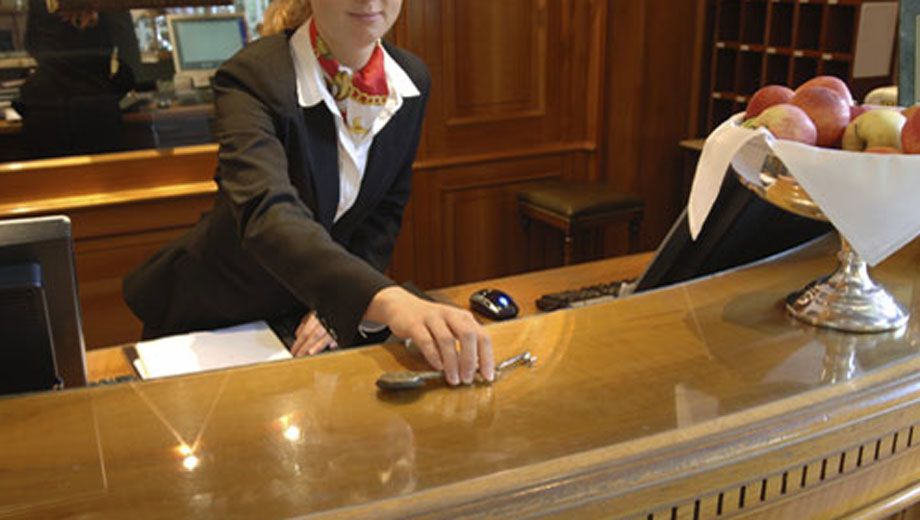Disclaimer
Executive Traveller may receive a commission when you apply for these credit cards via our links.
The information provided on this page is purely factual and general in nature. You should seek independent advice and consider your own personal circumstances before applying for any financial product.
It’s a nearly unavoidable part of the hotel check-in ritual: show your ID, sign the paperwork and then hand over your credit card as an advance against ‘incidentals’ – those one-off expenses ranging from a late-night attack on the minibar to dry cleaning and room service.
And it’s part of the ritual that doesn’t work for me. Especially when some hotels demand upwards of $50 per day, payable up front in one lump sum, as proof you can meet those incidentals.
My alternative? I pay the advance in cash with Australian dollars. Let me explain...
1. The credit card
The hotel doesn’t – or shouldn’t – be processing your incidentals deposit as a payment which will be reimbursed when you leave. The amount should only ever be an authorisation from the bank or financial company which issues the card, to indicate that your card is sufficiently in the black should the total amount of the deposit be required.
There are two pitfalls with this, and I’ve encountered both.
The first is the hotel failing to promptly clear the authorisation. In one instance the pre-approval for a $400 incidentals deposit sat on my account for almost one month, so those funds were marked as unavailable due to a pending transaction.
In the end I had to call and then email the hotel to have the the authorisation cancelled so the money was truly mine once again. This experience put me off using my plastic for an incidentals advance.
The second issue is that like many people I have a debit card, not a credit card – and some hotels cannot (or will not) accept a debit card for the incidentals deposit. Which leaves me out in the cold, and leads to...
2. Cash
It’s an easy fallback. Instead of handing over your credit card to be swiped, dig out the necessary number of bills. The desk clerk will write your details on the front of an envelope, insert the cash, seal the envelope with sticky tape and then have you sign across the tape.
The envelope is returned to you when it’s time to check out and you can use the cash inside (or your credit card) to settle up for those incidentals.
My beef against this? I’m always expected to use local currency. And you can bet that if I have enough cash on hand to cover a few days of incidentals then that fistfull of dollars will already be earmarked for some serious shopping. I don’t want to hand over a slab of my spending money as soon as I arrive and have it locked away until hours before I leave.
So for some time now my preferred payment for a hotel’s incidentals deposit – in fact, the one I insist upon – has been:
3. Aussie currency
It makes perfect sense. If the hotel will accept cash, why can’t they accept cash from another country instead of local currency?
So before each trip I visit the bank and withdraw A$500. That’s enough to cover a few days at almost any hotel. When I check in and am asked for a deposit to cover incidentals, I offer up those crisp Australian bills.
It might take a quick calculation of exchange rates so the desk clerk can confirm my strange-looking money is equivalent to the required amount, but it’s never been declined.
After all, if I’m in London or Barcelona or Japan I don’t need Australian dollars. Let me keep my pounds and Euro and yen in my wallet while the hotel locks away my Aussie dollars in their safe.
I pick up the cash-bearing envelope when I check out, settle any incidentals with my card or remaining local currency and head to the airport, with plenty of Aussie money already in hand for the week to come.
For more travel tips, follow @AusBT on Twitter.
Disclaimer
Executive Traveller may receive a commission when you apply for these credit cards via our links.
The information provided on this page is purely factual and general in nature. You should seek independent advice and consider your own personal circumstances before applying for any financial product.


10 Mar 2011
Total posts 526
I have more than one credit card so using one for them to keep a pre-authorisation on is no big deal to me.
Qantas - Qantas Frequent Flyer
28 Sep 2012
Total posts 131
Point 1 - and the comment about the hotel "not releasing funds" is incorrect.
Having worked "that side of the desk" for several years, it is the banking organisation who is failing to release funds.
If a pre-auth is taken, if the card is not used againts the pre-auth code within 7 days, the pre-auth supposed to drop off.
Sadly - despite this being the case, sometimes it does not work. When hotels contact the bank to release funds manually, you would be surprised how many of the banks have no clue that a pre-auth function even exists.
24 Oct 2010
Total posts 2554
cdinoz, thanks for the clarification – interesting to hear from the other side. Sadly, the end reuslt is the same, you end up being shorted for your money for a lot longer than necessary. Ben Sandlilands also makes some observations on this issue as well, at Plane Talking.
Qantas - Qantas Frequent Flyer
10 Jan 2011
Total posts 28
Travelling with cash is a pain, I don't think I'll do it.
My biggest gripe is not the credit card preauth (which doesn't bother me at all), but instead it's hotels running through a fresh charge at check-out rather than using their preauth funds.
For example, if I have 3 nights at a hotel at $250/night, the hotel might authorise $900 on my card ($750 for the room and $150 for incidentals). When I check out I've spent $850. Instead of charging against the existing $900 authorisation, they'll apply a new charge of $850.
That then blocks that initial $900 until the preauth expires (typically a week later) meaning I can't use those funds.
03 Jan 2011
Total posts 665
I tend to keep an "emergency cash stash" in my travel wallet, so handing over cash isn't a huge deal for me, but I usually hand over a charge card rather than a credit card.
My Amex Platinum is practically limitless, so the hotel can whack as much preauth against it as they like and it won't affect my ability to actually use it.
24 Oct 2010
Total posts 2554
The two best tips I've heard on this particular strategy:
1. Carry one large denomination note, say, 500 Euro, in your travel wallet and keep this for hotels.
2. Do NOT check out in a rush, or use 'express checkout', and forget to collect your envelope! (Especially if you've done the 500 Euroo note thing above.)
Qantas - Qantas Frequent Flyer
15 Jul 2012
Total posts 11
A very good idea.
There is an inherent logic to this too; hotels justify their credit card surcharge policy by quipping that you can always pay cash to avoid the surcharge. That being the case, they must be prepared to take cash for the deposit.
What's good for the payment goose is good for the deposit gander!
05 Nov 2012
Total posts 1
On a recent round-the-world trip, my spending money was fast being 'held up' with so many pre-auths being taken.
The quickest way that we found to get the money released was to charge something to the room. By charging dinner to the room, at checkout, staff would change the authorisation from say $400 to $40 for dinner. This meant the remaining $360 was quickly released and I didn't need to wait for the Authorisation to 'fall off'.
Not an ideal solution, but handy in a snitch.
Hi Guest, join in the discussion on Hotels: no, you don't need to swipe my credit card